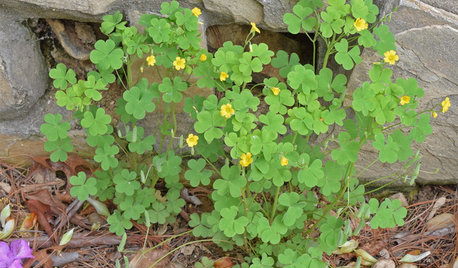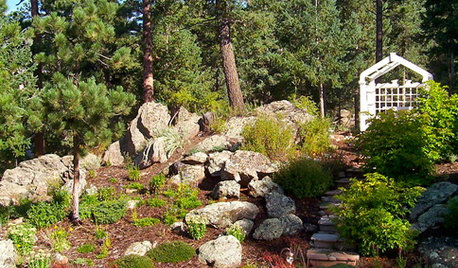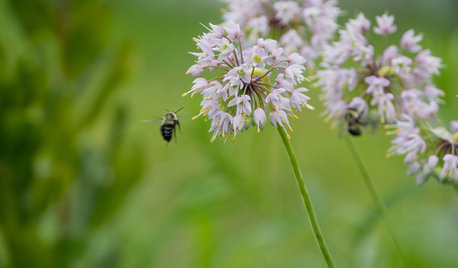How can i tell the ph of clay soil?
Dirtwreck
6 years ago
Featured Answer
Sort by:Oldest
Comments (30)
Dirtwreck
6 years agoRelated Discussions
how do i fix the ph level of my soil
Comments (5)We grow blackberries here at pH about like yours without issues. It won't hurt to add sulfur but your soil test doesn't tell you whether you can lower pH to any extent or how much sulfur to apply. You might not need to lower pH. What you need to know, relative to lowering pH, is how much free carbonates there are in your soil. This takes a further soil test. At pH 7.3 your soil might not have any free carbonates or it could have quit a lot. If there are free carbonates lowering pH to 6 will be difficult at best....See Moreclay-- soil pH
Comments (5)If you had a complete soil test done by a lab, then I would believe the pH number - if you used a home test, I would be skeptical, as those these tests are usually inaccurate as far as absolute numbers go. In other words, you can use one, and keep using it, to see how the pH of your soil alters over time, but the number you are getting may not be right, even though it will accurately reflect the changes. Sorry, this isn't coming out the way I want it to, so I hope I'm not confusing you.......See MoreHow do I adjust the PH of my soil?
Comments (18)Joe, youÂre amongst friends here. Like your joking statement, we all succumb to the urge of joking and occasionally taking a friendly shot now and then. But be warned, fools (not thinking you are BTW) and those who post without reading previous responses are not suffered well LOL. I got the jist of your comment good lock with the test kit! LOL. IÂm sure others did as well. One word of warning thought your post woke up smokemasterÂs dark side!!!!! No one is immune to his pepper humor. I still chuckle thinking about his pondering on crossing a Peter Pepper with a ? pepper to get a (censored) Pepper. ROFL. Yes, third shift sucks no shift sucks more! Let us know what test kit you buy. IÂll get one myself to compare notes with you. Peace, Bill...See MoreHow quickly can I lower pH of soil in order to plant acidic plants?
Comments (13)See if you can find Soil & Water dudes to talk to instead of Cooperative Extension. How old is the construction? If it is more than 5 years old, then alkaline leaching has already occurred, and you've got what you've got. My personal experience, living in a lime pocket among an assortment of lime pockets, is that most gardeners have been quite thoroughly brainwashed into thinking anything in the east has to be acidic. It just isn't so. So when confronted with an alternate reality, they come up with excuses. Concrete leaching is a classic. Older concrete doesn't leach, and the leaching doesn't travel much. I don't know how many times I've been told that I should stop liming, and then I will have 'normal' acidic soil. If you want to know how the neighbor grows camellias, go over and ask. And no, my soil doesn't fizz either, and my pH, and calcium numbers are very similar to yours....See Morergreen48
6 years agolast modified: 6 years agotoxcrusadr
6 years agogumby_ct
6 years agokimmq
6 years agogardengal48 (PNW Z8/9)
6 years agorgreen48
6 years agolast modified: 6 years agogumby_ct
6 years agolast modified: 6 years agokimmq
6 years agorgreen48
6 years agolast modified: 6 years agogardengal48 (PNW Z8/9)
6 years agorgreen48
6 years agolast modified: 6 years agotoxcrusadr
6 years agolast modified: 6 years agokimmq
6 years agotheparsley
6 years agoarmoured
6 years agogardengal48 (PNW Z8/9)
6 years agoarmoured
6 years agolast modified: 6 years agotoxcrusadr
6 years agogumby_ct
6 years agogardengal48 (PNW Z8/9)
6 years agorgreen48
6 years agolast modified: 6 years agotheparsley
6 years agotoxcrusadr
6 years agorgreen48
6 years agokokopellifivea
6 years agokimmq
6 years agogardengal48 (PNW Z8/9)
6 years agoDirtwreck
6 years agolast modified: 6 years ago
Related Stories

GARDENING GUIDESHow to Stop Worrying and Start Loving Clay Soil
Clay has many more benefits than you might imagine
Full Story
GARDENING GUIDES5 Prairie Wildflowers That Can Heal Your Soil
Get free, organic soil fertilizer with nitrogen-pumping plants that draw pollinators too
Full Story
GARDENING GUIDESGardening Solutions for Heavy Clay Soils
What’s a gardener to do with soil that’s easily compacted and has poor drainage? Find out here
Full Story
GARDENING GUIDESWhat Your Weeds May Be Trying to Tell You
An invasion of weeds can reveal something about your soil. Here’s what is going on and what to do about it
Full Story
REMODELING GUIDES8 Natural Home Materials That Can't Be Beat
See how designing with natural stone, clay, wood and more can give a house luminosity, depth of color and lasting appeal
Full Story
GARDENING GUIDESGet the Dirt on Your Garden’s Soil
Understand how your soil supports your plants so you can ensure your garden’s success
Full Story
GARDENING GUIDESHave Acidic Soil in Your Yard? Learn to Love Gardening Anyway
Look to acid-loving plants, like conifers and rhododendrons, to help your low-pH garden thrive
Full Story
GARDENING GUIDES9 Clay-Busting Native Flowers for Summer Sun
These plants survive and even thrive in tough clay soil east of the Rocky Mountains
Full Story
GARDENING GUIDESGrow a Beautiful Garden in Alkaline Soil
Got alkaline soil? Learn how to manage it and the many beautiful plants that will thrive in this ‘sweet’ soil
Full Story
BOOKSCan Tidying Up Result in Life-Changing Magic?
Organizing phenom Marie Kondo promises big results — if you embrace enormous changes and tough choices
Full Story



gardengal48 (PNW Z8/9)